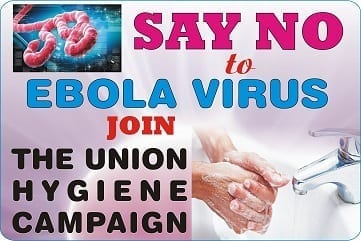
Liberia and Nigeria Unions Act against Ebola
Unions in Liberia and Nigeria are teaching union members, their families and local communities how to prevent transmission of the Ebola virus and speaking out on behalf of health care and other front-line workers.
The United Workers’ Union of Liberia (UWUL) and the Firestone Agricultural Workers Union of Liberia (FAWUL) announced a joint action plan last month and are currently directing community-based health education trainings for protection against transmission of Ebola virus disease (EVD).
The Movement for Labor Rights and Justice (MOLAJ)—a grassroots organization with links to UWUL and FAWUL—is providing Ebola awareness training, disinfectants and hand-washing buckets to Liberian communities.
“We wants to use [MOLAJ] to launch an S.O.S. call to all our partners to assist in any way possible to combat this dreadful EVD in our country to save the lives of workers and their families,” says David Sakoh, UWUL general secretary. MOLAJ’s efforts were boosted by a $15,000 donation from the United Steelworkers (USW) last month.
An effective union response is critical in Liberia. The World Health Organization (WHO) concluded last week that—with 14 of Liberia’s 15 counties having confirmed cases—the Ebola outbreak has completely outstripped the Liberian government’s ability to respond.
Unions in Nigeria are playing an important role in getting information to the grassroots about how to prevent Ebola infection and taking the lead in pressing for protection protocols for healthcare and other front-line workers.
The National Association of Nigerian Nurses and Midwives (NANNM), the Medical and Health Workers’ Union of Nigeria (MHWUN), and the Union of Textile Garment and Tailoring Workers of Nigeria (NUTGTWN) are conducting trainings for members as well as providing train-the-trainer workshops in communities, so as to broaden their outreach and better equip workers and communities to fight the infection.
The Nigeria Labor Congress (NLC) and several Nigerian sector unions are also distributing posters and handbills that explain Ebola and how workers can protect themselves and care for others, through local branch offices. In addition, the federation and several sector unions are calling for personal protective devices for at-risk workers and for the government to issue standard protocols for health care and other workers likely to be exposed to the virus—including port workers, air transportation workers and border workers. Unions representing healthcare workers are distributing union-printed copies of a WHO document providing infection prevention techniques for healthcare workers.
Last month the WHO reported that 12 Ebola cases were successfully contained within Lagos. Recently, though, several cases were confirmed in Port Harcourt, Rivers State. By September 8, 477 people were under quarantine in Port Harcourt and by last Friday that number had risen to 490.
The Ebola outbreak has killed more than 2,000 people across West Africa, including Liberia, Guinea, Sierra Leone and Nigeria and Senegal. Last week the WHO estimated that as many as 20,000 people in West Africa may become infected.
